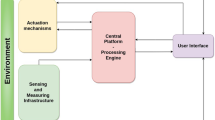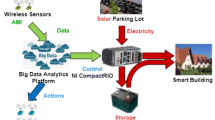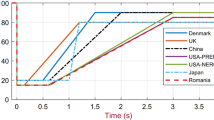Abstract
Home energy management system (HEMS) is a section of demand response (DR), that plays an imperative role in the residential areas towards appliance management for the enhancement of energy efficiency and grid stability. In this article, a methodical home energy management system (Methodical-HEMS) was proposed based upon K-means, a machine learning algorithm and satin bowerbird optimization (SBO) algorithm to optimize the scheduling of appliances within a 24-h period. The K-means algorithm is used for defining the discrete comfort window (DCW) for schedulable appliance, while SBO algorithm is used for defining the suitable time slots for the schedulable appliance to operate within the DCW. Methodical-HEMS is considered for a single home with the day ahead time of use pricing, to minimize the overall electricity bill (EB) and to satisfy the consumer’s comfort. The performance of Methodical-HEMS is evaluated with other heuristic algorithms, including a particle swarm optimization algorithm, grey wolf optimization algorithm, artificial bee colony algorithm and genetic algorithm. The simulation outcomes demonstrate that, the SBO based HEMS algorithm effectually reduces the overall EB from ₹ 29.14/day to ₹ 22.84/day, minimizes the peak-to-average ratio by 10.28% and remains uncompromising on the consumer’s comfort.










Similar content being viewed by others
References
Albadi MH, El-Saadany EF (2008) A summary of demand response in electricity markets. Electr Power Syst Res 78(11):1989–1996
Awais M, Javaid N, Shaheen N, Iqbal Z, Rehman G, Muhammad K, Ahmad I (2015) An efficient genetic algorithm based demand side management scheme for smart grid. In: 18th international conference on network-based information systems, pp 351–356
Bishop C (2006) Pattern recognition and machine learning. Springer, Berlin
Chellamani GK, Venkatesh Chandramani P (2019) Demand response management system with discrete time window using supervised learning algorithm. Cogn Syst Res 57:131–138. https://doi.org/10.1016/j.cogsys.2018.10.030
Chen C, Kishore S, Snyder LV (2011) An innovative RTP-based residential power scheduling scheme for smart grids. In: Proceedings IEEE ICASSP, Prague, Czech Republic, pp 5956–5959
Karaboga D, Akay B (2009) A comparative study of Artificial Bee Colony algorithm. Appl Math Comput 214(1):108–132
Fei H, Li Q, Sun D (2017) A survey of recent research on optimization models and algorithms for operations management from the process view. Sci Program. https://doi.org/10.1155/2017/7219656
Gan G, Ma C, Wu J (2007) Data clustering: theory, algorithms, and applications. SIAM, Society for Industrial and Applied Mathematics, Philadelphia. American Statistical Association, Alexandria
Herter K, Wayland S (2010) Residential response to critical-peak pricing of electricity: California evidence. Energy 35(4):1561–1567
Hussain HM, Javaid N, Iqbal S, Hasan QU, Aurangzeb K, Alhussein M (2018) An efficient demand side management system with a new optimized home energy management controller in smart grid. Energies 11(1):190
Jung YG, Kang MS, Heo J (2014) Clustering performance comparison using k-means and expectation maximization algorithms. Biotechnol Biotechnol Equip 28(1):S44–S48
Kennedy J, Eberhart R (1995) Particle swarm optimization. Proc IEEE Int Conf Neural Netw 6:1942–1948
Khan SS, Ahmad A (2004) Cluster centre initialization algorithm for K-means clustering. Pattern Recogn Lett 25(11):1293–1302
Liang Y, He L, Cao X, Shen Z (2013) Stochastic control for smart grid users with flexible demand. IEEE Trans Smart Grid 4(4):2296–2308
Ma J, Chen HH, Song L, Li Y (2016) Residential load scheduling in smart grid: a cost efficiency perspective. IEEE Trans Smart Grid 7(2):771–784
Mahmood A, Javaid N, Khan MA, Razzaq S (2015) An overview of load management techniques in smart grid. Int J Energy Res 39(11):1437–1450
Mahmood D, Javaid N, Alrajeh N, Khan ZA, Qasim U, Ahmed I, Ilahi M (2016) Realistic scheduling mechanism for smart homes. Energies 9:202. https://doi.org/10.3390/en9030202
Mahmoudi N, Saha TK, Eghbal M (2014) Modelling demand response aggregator behavior in wind power offering strategies. Appl Energy 133:347–355
Man KF, Tang KS, Kwong S (1996) Genetic algorithms: concepts and applications [in engineering design]. IEEE Trans Ind Electron 43(5):519–534
Moosavi SHS, Bardsiri VK (2017) Satin bowerbird optimizer: a new optimization algorithm to optimize ANFIS for software development effort estimation. Eng Appl Artif Intell 60:1–15
Negreiros M, Palhano A (2006) The capacitated centred clustering problem. Comput Oper Res 33(6):1639–1663
Ozturk Y, Senthilkumar D, Kumar S, Lee G (2013) An intelligent home energy management system to improve demand response. IEEE Trans Smart Grid 4(2):694–701
Rahim S, Javaid N, Ahmad A, Khan SA, Khan ZA, Alrajeh N, Qasim U (2016) Exploiting heuristic algorithms to efficiently utilize energy management controllers with renewable energy sources. Energy Build 129:452–470
Rasheed MB, Javaid N, Awais M, Khan ZA, Qasim U, Alrajeh N, Iqbal Z, Javaid Q (2016) Real time information-based energy management using customer preferences and dynamic pricing in smart homes. Energies 9:542. https://doi.org/10.3390/en9070542
Reddy SS (2017) Optimizing energy and demand response programs using multi-objective optimization. Electr Eng 99:397–406. https://doi.org/10.1007/s00202-016-0438-6
Mirjalili S, Mirjalili SM, Lewis A (2014) Grey wolf optimizer. Adv Eng Softw 69:46–61
Soares A, Gomes A, Henggeler Antunes C, Cardoso H (2013) Domestic load scheduling using genetic algorithms. In: Esparcia-Alcazar AI (ed) Applications of evolutionary computation, vol 7835, pp 142–151
Souza Dutra MD, Anjos MF, Le Digabel S (2019) A realistic energy optimization model for smart-home appliances. Int J Energy Res 43(8):3237–3262
Suri S (1989) Computing geodesic furthest neighbors in simple polygons. J Comput Syst Sci 39(2):220–235
Tsui KM, Chan SC (2012) Demand response optimization for smart home scheduling under real-time pricing. IEEE Trans Smart Grid 3(4):1812–1821
Zhao B, Zhang X, Li P, Wang K, Xue M, Wang C (2014) Optimal sizing, operating strategy and operational experience of a stand-alone microgrid on Dongfushan Island. Appl Energy 113:1656–1666
Author information
Authors and Affiliations
Corresponding author
Ethics declarations
Conflict of interest
The authors declare that they have no conflict of interest.
Additional information
Publisher's Note
Springer Nature remains neutral with regard to jurisdictional claims in published maps and institutional affiliations.
Rights and permissions
About this article
Cite this article
Chellamani, G.K., Chandramani, P.V. An Optimized Methodical Energy Management System for Residential Consumers Considering Price-Driven Demand Response Using Satin Bowerbird Optimization. J. Electr. Eng. Technol. 15, 955–967 (2020). https://doi.org/10.1007/s42835-019-00338-z
Received:
Revised:
Accepted:
Published:
Issue Date:
DOI: https://doi.org/10.1007/s42835-019-00338-z




